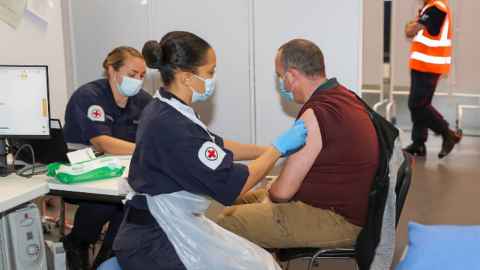‘Freedom’ in the UK a reckless decision for us all
19 July 2021
Opinion: Lifting Covid restrictions in the UK means short-term freedom there, but will extend the long-term sentence for the world, writes Helen Petousis-Harris.

This Monday is 'Freedom Day' in the UK. This is the day when almost all legal Covid-19 restrictions across the four nations, like mask wearing and social distancing, will lift completely or relax.
England will become the most unrestricted country in Europe.
The UK government is pushing ahead with this plan despite loud and informed opposition from scientific and medical experts; and despite recording 30,000 new cases of Covid-19 every day for almost a week (at the time of writing).
To say this action is a bit of a worry is a vast understatement. Without a lot more people vaccinated, the move is likely to have disastrous consequences. With only half of the population vaccinated, the move is really setting up the perfect conditions for variants to develop that evade existing immunity.
A letter to the medical journal The Lancet signed by more than 1200 leading scientists called the move “unscientific”, “criminal” and “unethical”. These are harsh criticisms to be sure. Are they justified?
Let’s consider the situation. It is true that relative to many other large populations, the UK has a highly vaccinated population, in particular their elderly. However, there is still a huge number and proportion of people who are unvaccinated, particularly the young. Lifting all restrictions gives the virus freedom to circulate widely and freely among the unvaccinated, and to a far lesser extent the vaccinated. It will make many of these people sick, including some of the vaccinated, although the course of the disease will be generally be much milder. Here, the point is, there are still many people who will become sick, and some will die.
What is really scary is that as the virus incubates in each host, it mutates - and the more incubators (ie people who catch the disease) the more mutations and the higher the chances that variants able to evade natural and vaccine immunity will arise. Because there will be a huge number of infectious people, there will be enormous viral pressure on those who have been vaccinated. This increases the chances of more vaccinated people becoming infected (even if they are not sick) and the virus being forced to mutate to evade their immunity. Yikes!
These new variants will quickly spread to other populations because they will be more ‘fit’ – survival of the fittest and all. We will need to rapidly create new vaccine formulations that can be delivered urgently to the global population. Like we were not already up to our eyeballs in trying to do this.
Apart from the morbidity and mortality (sickness and death) that will occur in the UK, particularly among younger people, this utterly reckless move has the capacity to undo the phenomenal efforts we have undertaken to develop and deliver vaccines, and the pain we have endured in trying to minimise the spread of this plague – masks, lockdowns and so on.
Of course, there are many other populations where variants that can better evade our immunity have evolved, and are evolving, such as the now common Delta variant and the newer Epsilon. If we do not dampen down the number of cases worldwide at some point we will run out of the Greek alphabet, which only has 24 letters.
However, with its relatively high but very incomplete vaccination coverage, the UK is now more likely to give rise to vaccine resistant variants. While 90 percent of eligible adults have received one dose, only two-thirds have had two doses. However, in London only 45 percent of adults over 18 years have had both doses. More than 20 percent of the UK population are aged under 18 and this is where the virus can have free rein.
The UK should have completed their vaccine programme first before making this move. It may grant a spell of short-term freedom for the UK, but it is likely to extend the long-term sentence for the rest of the world.
Associate Professor Helen Petousis-Harris is a vaccinologist in Faculty of Medical and Health Sciences and co-director of the Global Vaccine Data Network, which will lead research on the safety and effectiveness of Covid-19 vaccines across the world.
This article reflects the opinion of the author and not necessarily the views of the University of Auckland.
Used with permission from Newsroom ‘Freedom’ in the UK a reckless decision for us all 19 July 2021.
Media queries
Alison Sims | Research Communications Editor
DDI 09 923 4953
Mob 021 249 0089
Email alison.sims@auckland.ac.nz